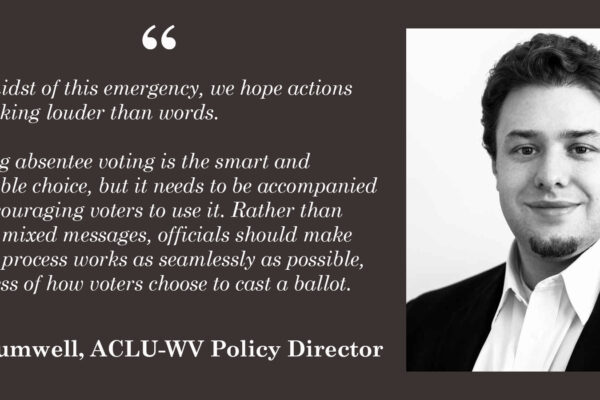By Eli Baumwell
ACLU-WV Policy Director
Our state officials have taken extraordinary steps to promote absentee voting during the Covid-19 emergency. They have given every voter in the state the option of voting by absentee ballot, and they have sent applications for absentee ballots out to every registered voter. Counties are limiting the number of polling places that will be open; Harrison county will have only seven compared to the usual 67.
At the same time both Governor Justice and Secretary of State Mac Warner have expressed skepticism about absentee voting. The Governor claimed, without evidence, that voter fraud is rampant with absentee voting. The Secretary of State said the act of voting should take place in a voting booth.
In the midst of this emergency, we hope actions are speaking louder than words. Enabling absentee voting is the smart and responsible choice, but it needs to be accompanied with encouraging voters to use it. Rather than sending mixed messages, officials should make sure that the process works as seamlessly as possible, regardless of how voters choose to cast a ballot.
The work that has been done to expand absentee voting is commendable, but there are still steps that can be taken to make the process better.
The state can work with first time voters who registered by mail or online to provide an ID if they don’t have access to a copier. We can also develop a process to give voters a chance to correct technical issues with absentee ballots rather than having their ballot discounted. We can also ensure voters are notified and have a chance to verify their identity if there are questions about their signature.
Still, some people may simply prefer in-person voting, others may need to vote in person. Reducing the number of polling places makes in-person voting harder; it can even result in voter disenfranchisement. People have to travel further to reach a polling place, which poses problems for people with limited transportation and financial means. Fewer polling places means longer lines, which can discourage people from voting. Long lines also mean less social distancing, presenting real health risks.
These are real and significant problems, even if there are legitimate reasons to close polling places. These problems can be mitigated though.
We can ensure that early voting is accessible at open polling places for the entire early voting period. We can do what the Harrison county clerk did by making the change early enough for people to plan accordingly. Most importantly, we can encourage people to use the absentee voting system – which is why disparagement of absentee ballots is so counterproductive.
All elected officials will talk about the importance of voting. This crisis will challenge their commitment to that principle. Their actions will ultimately mean more than their words.

